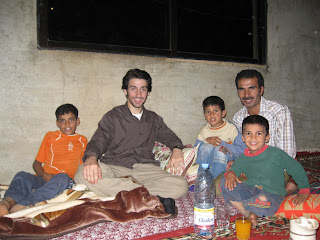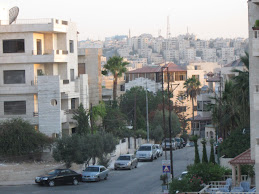Badia Journal
September 27-29, 2008
Day 1: September 27th
Today I arrived at my Bedouin home stay around noon. Upon arrival I was introduced to the different members of the family. I will be spending my weekend with Ahmed, his brother Mohammed, and Mohammed’s family. After introductions, Mohammed had me quiz one of his three sons, Abdelrahman in his English skills. I also quizzed his older son Sami, who they repeatedly told me was lazy, in his English as well. Then I met Mohammed’s third and youngest son, Basam.
Soon after a family friend, Abu Amir paid a visit to the family. After some introduction and going through the standard questions, such as “Are you married?”- They took me on a small journey through the village. We looked at a few nearby farms, and Ahmed explained to me that the road we were on was an oil pipline or “tap line” as they called it-I had trouble fully understanding what they were explaining to me. This line is used to deliver oil from Iraq to Jerusalem and other surrounding countries such as Lebanon and Syria. Beside this road was what appeared to be some type of oil pump that was constructed by the British many years ago. After our journey through the farms, we stopped by a traditional Bedouin tent. I enjoyed this because I had an old fashioned, authentic Bedouin experience. Ahmed and his family live in a small home with no livestock, and while it does not come close to having all the comforts of city life, they do have more than traditional Bedouins. The Bedouin family in this tent did not speak any English, so with some help from Ahmed, Mohammed, and Abu Amir I told them about myself in Arabic. Then, an older Bedouin man, Ibu Mohammed, decided to dance for us. Whether or not he was seriously dancing was hard to tell, since I could not make out most of what was being said, but I was under the impression he was joking around. In any case, I got his show on video, and it was very entertaining for us.
Later that night, I joined in an Iftar meal with the men of the family and Abu Amir. Our meal included a Jordanian dish, Maqlooba, which is chicken over rice, with salad, soup, and yogurt. In traditional Bedouin style, we ate to together on the floor, and with a spoon as our only utensil we all ate from the big dish of Maqlooba together. The rest of the night included several hours of watching TV and teaching the family some English vocabulary while they taught me Arabic. That night I slept outside with Ahmed. It’s the closest I’ve come to camping in several years.
I made several observations on my first day that differ from experiences I’ve had with my family in Amman. For one thing, Bedouins love pictures. They made sure I had my camera with me everywhere we went, and they would have me take pictures of anything and everything from the portrait of Saddam Hussein that hangs proudly on their wall, to pictures of themselves posing on rocks or in front of old Bedouin homes. Most of the time, they just requested that I take individual pictures of them and their family; so many pictures do not even include me. Another observation I made was the role of women in a Bedouin home, or at least my Bedouin home. I was never introduced to Mohammed’s wife or sister, who also lives there with her baby daughter. The women spent most of their time in the kitchen or in a separate part of the house, never coming out to where the men were socializing unless it was to serve or clean up food. When it came time for Iftar, the men ate together while the women and children ate separately in the other half of the home. Even though I live with a Muslim family in Amman, they are not traditional and my host father often helps my host mother, and he often does more chores around the house than she does. Experiencing this in a Bedouin lifestyle was a very different experience for me and interesting to observe.



Day 2-September 28th
Today did not see much activity and involved a lot of sitting around. After being awakened by the dogs, roosters, sheep, and hundreds of other various livestock that inhabit the village around us, I got dressed and went inside to study Arabic. Ahmed came in frequently and spent a lot of with me, quizzing me in Arabic and asking me about various English words and grammar. He desires to steadily improve his English because it is his dream to someday travel to the United States. Both in Amman and in the Badia, nearly every local resident has expressed their love for the USA or their strong desire to go their. Unfortunately, it is difficult for Arabs to obtain visas to the United States these days, so I am often asked, as I was this weekend, why it is so hard. This desire to travel to America has led some residents I’ve met to request that I speak to them in English so they can improve on their language skills. This is also the reason why Ahmed and Mohammed had me quiz their family in English so many times throughout the past couple days.
For an hour in the afternoon I went for a walk through the village with Ahmed. Ahmed showed me some more farms and pointed out some other Bedouin tents and villages in the distance before we headed back to the house.
Some observations I made at tonight’s Iftar contradicted those that I made yesterday. Tonight we were joined by Mahmoud, a brother of Ahmed and Mohammed who serves in the Jordanian military. Like Ahmed, Mahmoud dreams of one day traveling to America. Tonight we were also joined by one of Mohammed’s daughters, Jamela, and one of his sons. What I observed yesterday led me to believe that women and children ate separately from the men, but tonight challenged those observations. After Iftar, we were joined by joined Mohammed’s wife, their sister, and two other women from the village. I had developed the impression that men and women did not socialize in the same part of the house, but perhaps this is not always the case.
Later on the evening we headed over a friend’s house where another SIT student was staying. We spent a couple hours there talking, drinking tea, and smoking arghele.





Day 3-September 29th
This morning Abu Amir took me to the local girl’s school where I had the opportunity to observe an English class. Much of what this class was studying included grammar terms and phrases that I had never heard of or had completely forgotten about. Listening to the teacher discuss grammar rules such a present participle and modals made me relieved to not be teaching the class, although I would have done so in a heartbeat. What did surprise me, however, was how basic their level of English still is. After class, the teacher told me that these girls were in an upper level class and they had already been studying English for ten years. I don’t know much, if anything at all about the education system here, but I would imagine that after ten years of studying English these students would be proficient, or at least close to a level of proficiency in the language. Instead I found them to be still studying basic grammar and structure. I feel as though I have studied as much Arabic in 18 months as they have English in ten years.
After my school visit, Abu Amir took me the local hospital where he works as a security guard. I spoke to several doctors at the hospital, and had to answer many questions clarifying why I was there, who I’m with, and what I’m doing in the Badia-Bedouins tend to be wary of spies. Like most doctors in Jordan, they were proficient in English and well-trained to do their jobs. Several of the doctors did not live in the Bedouin villages but commuted from larger cities such as Amman or Mufraq. It is my understanding that they make such long commutes because doctors in Jordan are required to work for at least one year in the Badia. I was impressed with the doctors at this hospital, and if something were to happen to me here I would trust myself in their hands.





The next three days will be spent in Amman celebrating Eid-the feast that takes place at the end of Ramadan. Fasting has ended, and restaurants will be open during the day now. Eating, smoking, and drinking in public are no longer prohibited. After the Eid holiday everyone will resume a normal working schedule, and life will return to the way it was prior to the beginning of the month. I'm glad I had the chance to experience Ramadan in the Middle East. I witnessed and participated in traditions and practices, observed how an entire country changes their lifestyle for one month, and ate food that I would not have eaten otherwise. However, I'm looking forward to life returning to normal here. The lifting of all the social and legal traditions that come with Ramadan has been somewhat liberating.
On Friday I'll be traveling to Egypt for a week to experience life in another major Arab city. We will travel back to Amman for a week and then spend the following week traveling through Southern Jordan, seeing the Dead Sea, Wadi Rum, Petra, and Aqaba.
Salaam




























